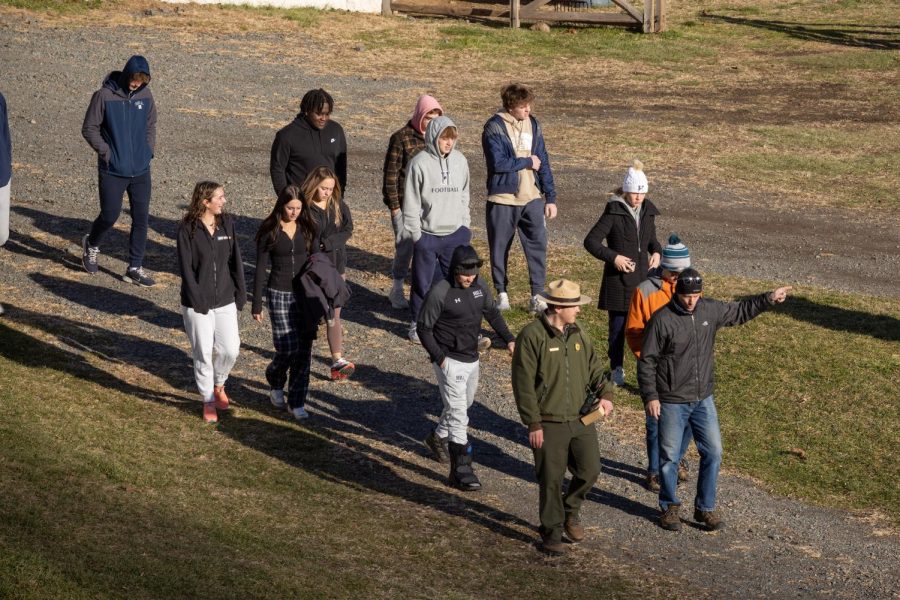H-term shifts gears on its third year after lifted pandemic restrictions
Media: Sarah Bender
Mark Nelson’s Get Outdoors PA class takes a scenic walk around Hopewell Furnace National Historic Site.
Many attributes of H-term from its inaugural term until this year’s H-term have outstanding distinctions. Many 5th and 6th formers who attended Hill during the 2020 school year can support this assertation. From the change in the time of year to the changes in the class schedule, H-term has evolved over the past three years to better the experience of the Hill community
According to the school’s website, “H-term is The Hill School’s distinctive, experiential, and interdisciplinary mini term held between the Thanksgiving and winter holiday breaks.” Established in 2020, H-term allows students “to explore non-traditional courses that offer more opportunities for collaboration and creative learning, as well as off-campus internships and independent study projects.” However, H-term in 2020 looked very different from its current design. For example, in 2020, H-term was completely remote. During the months of January and February, faculty members taught virtually several hours a day, five days a week, for six weeks to various groups of students who were grouped together by form.
“H-term was a way for us to keep the community engaged while everyone was remote,” Dean of the Quadrivium Jared Courtney explains. After receiving feedback from students, the administration decided that H-term would return the following school year. The Hill community liked the idea of having a time of learning with classes that you wouldn’t traditionally see in high schools.
Preceding the 2021-2022 school year, the administration worried about a wintertime surge of COVID-19 cases at Hill. Therefore, they decided to push back H-term to December to combat the COVID surge, as well as aid international students who faced travel restraints and quarantine restrictions. During this time, H-term consisted of two in-person classes, one in the morning and one in the afternoon, each for two and a half hours. Afterwards, the administration collected feedback again through a community-wide survey and spent the remainder of the calendar year redesigning H-term.
A common theme in student and faculty responses highlighted the need for more than two classes, as well as a mix of some shorter classes and some longer classes. Acting upon this feedback, the administration and teaching faculty designed shorter morning classes such as math, sewing, and humanities, each for one hour and 15 minutes. These morning classes were to be generally suited for an academic setting. An afternoon period would last for two and a half hours and be more experiential. Courtney added, “We wanted students getting out of seats, doing things and collaborating. Some classes go off-campus.”
Moniyah Person-Henderson ’23 witnessed the evolution of H-term firsthand. H-term was created during her 4th form year at Hill. During this time, Person-Henderson was a virtual student who completed an independent study project in addition to her weekly classwork. She even took a step further and created her own company alongside a close friend. “It was truly a time for us to step outside the box and try something different that we would not otherwise normally do,” Person-Henderson explained. The following year, MoniYah Person-Henderson took an online Harvard course about advanced topics in computer science, worked on an independent study and finished another course where she was able to design her own prototype of a “green” home in the future. This year, for her 6th form year, Person-Henderson completed an independent study, but she also enrolled in two H-term classes. She enjoyed that all students who were working on an independent study project were placed in a classroom together, which was a change from last year when she was lonely in the library working for two hours.
While many students at Hill enjoy H-term because it provides an opportunity for students to relax and still learn by taking unique courses that would not be found elsewhere, others believe that H-term is a setback regarding their academic work.
Layla Choudhri ’26 is part of the group that believes that H-term is beneficial. Choudhri commented, “I think that this is a great adjustment period. These two weeks are at an awkward time and starting new topics would not carry out well into January. This is also a great time to spend time with other friends in forms that you normally would not have.”
On the other hand, Ella Lee ’24, finds that H-term can have negative effects on teachers and students alike. Lee explained, “I think as a junior it’s tough losing that much academic time with AP’s. Despite the fact that Hill chooses not to continue academic work, the rest of the world does, and the AP test doesn’t change. I think H-term has an impact on the pacing of work, especially for honors and AP’s which puts a lot of stress on teachers, which is negative. With that being said, I am grateful to have found a productive way to spend my H-term interning.”
Although H-term has certainly changed, Hill students are still optimistic about its place here at Hill. Person-Henderson concluded, “I think H-term is a wonderful time for students to learn about their interests outside of the classroom from truly wherever in the world. I am excited to see how it advances for future students.”
























